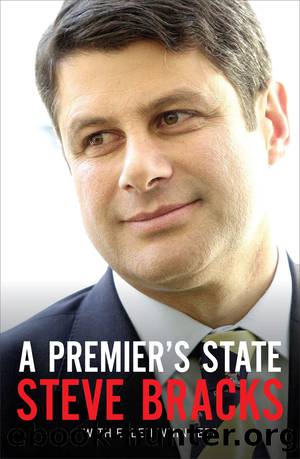A Premier's State by Whinnett Ellen;Bracks Steve;

Author:Whinnett, Ellen;Bracks, Steve; [Steve Bracks, Helen Whinnett]
Language: eng
Format: epub
Publisher: Melbourne University Publishing
12
Rules of Engagement
To work through testing or controversial issues as a politician, you need to show strong leadership, which means being prepared to both argue and educate. The key things are to be sure of what you want and to have clearly articulated policies that have been worked through with the groups that are particularly affected by them. The detail of how your proposals will be implemented should also be worked through before the public debate is held.
You have to argue your case again and again, and engage other people in your argument by showing that you see things from their perspective, or understand their circumstances. Itâs no use just saying to someone that black is white, but you might get away with saying that itâs grey if you understand where that person is coming from. You have to look at their domestic circumstances and their economic situation; you have to understand their side of the argument before you can hope to bring them around to your position. I first learned this in Ballarat in the 1980s and I applied it to everything that I did in my work afterwards: in Ballarat, in opposition, and in government as well.
When Labor won government in Victoria, for example, we instituted a mandated target for renewable energyâ20 per cent of all the energy used in the state had to come from renewable sources, primarily wind turbines, with an alternative being to draw on Tasmaniaâs hydroelectric schemes. But renewable energy was more expensive than conventional energy. It only involved a small price increase for consumers because the cost was aggregated across the whole of the community, but nevertheless, energy prices did go up.
Wisely, we had determined every part of that policy down to the last detail. This had required discussions with stakeholders that included energy companies, consumer groups, the Victorian Council of Social Services, the Victorian Employersâ Chamber of Commerce and Industry, and other organisations that had an interest in the issue. We held those discussions before we released our policy, and thereby anticipated the publicâs needs and their reaction.
If we had simply floated our proposition by saying, âWeâre going to put up your electricity prices to pay for renewables, including wind power,â people would probably have said no. But we understood that any increase in the cost of energy has an impact on individuals, families and businesses, and that we had to clarify what the advantages would be. We did this by explaining the significant environmental benefits to future generations who will rely less on brown coal and more on methods of power generation that produce fewer emissions. Yes, there was a cost, and we explained it clearly, but we also explained the benefits.
Water was another contentious and difficult issue, and had been from before the 2002 election. Every year of my government saw reduced inflows from Victoriaâs streams into its reservoirs. The drought we were experiencing was so severe that we could no longer rely on the hundred-year average rainfall figures but had to use the ten-year average.
Download
This site does not store any files on its server. We only index and link to content provided by other sites. Please contact the content providers to delete copyright contents if any and email us, we'll remove relevant links or contents immediately.
| Military | Political |
| Presidents & Heads of State | Religious |
| Rich & Famous | Royalty |
| Social Activists |
Waking Up in Heaven: A True Story of Brokenness, Heaven, and Life Again by McVea Crystal & Tresniowski Alex(37052)
Empire of the Sikhs by Patwant Singh(22220)
We're Going to Need More Wine by Gabrielle Union(18121)
Hans Sturm: A Soldier's Odyssey on the Eastern Front by Gordon Williamson(17103)
Leonardo da Vinci by Walter Isaacson(11965)
The Radium Girls by Kate Moore(10961)
Educated by Tara Westover(7107)
Tools of Titans by Timothy Ferriss(7018)
How to Be a Bawse: A Guide to Conquering Life by Lilly Singh(6736)
The Last Black Unicorn by Tiffany Haddish(5101)
Permanent Record by Edward Snowden(5048)
The Rise and Fall of Senator Joe McCarthy by James Cross Giblin(4865)
Promise Me, Dad by Joe Biden(4490)
The Wind in My Hair by Masih Alinejad(4452)
The Crown by Robert Lacey(4137)
A Higher Loyalty: Truth, Lies, and Leadership by James Comey(4071)
The Iron Duke by The Iron Duke(3674)
Joan of Arc by Mary Gordon(3291)
How to be Champion: My Autobiography by Sarah Millican(3209)
